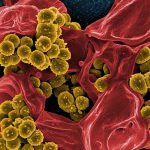Our gut bacteria – also referred to as our gut flora or our microbiota – have many diverse and important roles in the body. The more we learn about these trillions of inhabitants, the more we realise they contribute to our physical, mental and emotional health – or otherwise. So far we have uncovered the following:
- We absorb most of the sugar, fat and protein we eat through our small intestine. What remains is the indigestible components of food such as fibre. Fibre reaches the large intestine where bacteria convert it into short chain fatty acids (SFAs) such as acetate, propionate and butyrate. Butyrate keeps the cells of the colon healthy, decreases inflammation and may even reduce the risk of developing colon cancer.
- Colon bacteria also produce a wide range of other chemicals and hormones that can influence hunger, food cravings, mood, energy levels and general health.
- Gut bacteria help regulate body weight. Different bacteria extract more or less energy from the food we eat. People who carry more bacteria belonging to the phylum Firmicutes extract more calories from their food than people with a higher percentage of another phylum called Bacterioidetes. What this means is that two people can eat the exact same foods but one of them gains more body fat because the bacteria in their gut enable them to absorb more of the calories.
- Gut bacteria can neutralise many of the toxins we ingest. If you have fewer of these detoxifying bacteria, you increase the workload of your liver.
- Friendly bacteria protect us from becoming infected by harmful organisms (referred to as pathogens) by creating a physical barrier or by producing substances that are toxic to the invaders.
- Your microbiota train and regulate your immune system to recognise what it should and shouldn’t attack. When we have an imbalance in our gut flora, we have a higher risk of allergies, autoimmune diseases and inflammatory conditions (which includes just about every chronic disease from arthritis to diabetes to dementia).
- Gut bacteria produce neurotransmitters such as dopamine, serotonin and GABA which contribute to feeling relaxed and happy.
- Intestinal bacteria synthesise vitamins B1 (thiamine), B7 (biotin), folate, B12 and vitamin K, and they facilitate absorption of minerals such as magnesium, calcium and iron.
The important thing to remember is that we have a two way relationship with our microbes. We are not entirely at their mercy just as they are not defenceless against us. The ideal situation for both parties is to treat each other well. Subsequent HEBs will shed light on how we can go about this.
* To read other HEB’s in the gut series click below:


